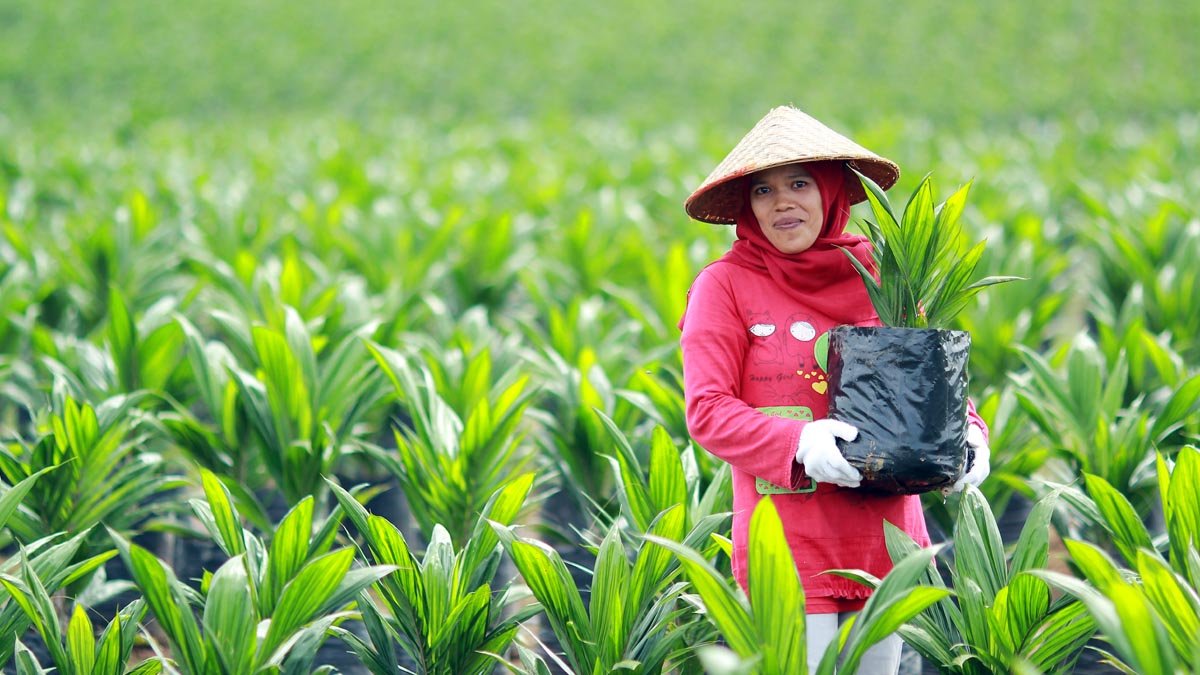PALMOILMAGAZINE, JAKARTA — Gender inclusion has become a central pillar in the sustainability standards of the palm oil industry, both under the Roundtable on Sustainable Palm Oil (RSPO) and the Indonesian Sustainable Palm Oil (ISPO) schemes. Both frameworks emphasize that gender mainstreaming is not an optional add-on, but a mandatory element that must be embedded into plantation management—whether by companies or smallholders. Respect for gender equality is a fundamental principle that cannot be compromised.
Yet field realities reveal a significant gap. A study by Fatchiya, Anna (2022) in Lampung shows that oil palm plantation management is still dominated by men. Women—who should have strategic roles—are instead concentrated in maintenance tasks such as fertilizing or leaf care. Their burden is doubled, as most women still shoulder extensive domestic responsibilities on top of plantation work.
The challenges are even more complex. Studies by Rini Hani et al. (2017) highlight persistent issues including lower wages for women, weak safety standards, health risks, and even cases of sexual harassment. Among independent smallholders, data from the Indonesian Independent Smallholder Farmers Association (APSSI) reveal how limited women’s participation remains. Out of 700 supported farmers, only 42—or about 6 percent—are actively involved, mainly in fertilizing, collecting loose fruit, and weeding activities.
Also Read:
The same inequality appears in training participation. In Good Agricultural Practices (GAP) field schools, women make up only 10 percent of participants (75 of 750). Yet, as emphasized by Tengku Indira Larasati (2025), women hold a strategic role in the development of the palm oil industry. Unfortunately, access to training and decision-making roles is restricted by structural barriers, social norms, and the uneven implementation of gender-sensitive regulations.
Economic factors also play a role. Research by Sari, Maya et al. (2023) shows that household size, work duration, and land area influence women’s contribution to household income. The smaller the landholding, the greater the involvement of women in income-generating activities.
This potential should be viewed as an opportunity. In APSSI-supported areas such as Rakit Kulim and Batang Cenaku in Indragiri Hulu Regency, women play a central role in managing household finances. However, limited business management knowledge means that less than 10 percent of household income is allocated for plantation upkeep—far below what is needed to maintain productivity. Unsurprisingly, yields remain low.
APSSI’s 2023–2024 data show that average production in independent smallholder plantations is only about 700 kg/ha/month. This lags far behind large plantations in Riau, which produce around 4,361 kg/ha, while smallholders in general average 3,595 kg/ha (Provincial Plantation Office of Riau, 2015). Low productivity directly affects household income.
For this reason, gender mainstreaming must be seen as a strategic investment to boost productivity and sustainability among smallholder farmers. By expanding women’s access to training, decision-making roles, and workplace protection, the smallholder palm oil sector can tap into a vast reservoir of untapped potential.
More broadly, women’s participation not only strengthens social sustainability in line with RSPO and ISPO criteria but also helps reinforce smallholder household resilience. Ultimately, empowering women becomes a crucial bridge in transforming independent smallholder plantations into a more inclusive and sustainable pillar of Indonesia’s national palm oil industry.
Writer: Muhamad Yazid Fauzi, Lecturer in Islamic Community Development STAI, Nurul Falah
Disclaimer: This article reflects the author’s personal opinion and is entirely their responsibility.
